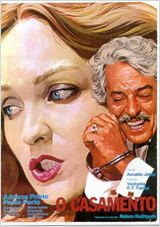Filme da Semana: The Marriage (1976), Arnaldo Jabor

The Marriage (O Casamento, Brazil, 1976). Directed by Arnaldo Jabor. Written by Arnaldo Jabor from the novel by Nélson Rodrigues. Cinematography by Dib Lutfi. Edited by Rafael Valverde. Set decoration and costumes by Francisco Altan & Mara Chaves. Cast: Adriana Prieto, Paulo Porto, Camila Amado, Nélson Dantas, Érico Vidal, Fregolente, Mara Rúbia, Carlos Kroeber, André Valli, Cidinha Millan.
Glorinha (Prieto) is on the eve of her wedding when a series of revelations torments her and her circle of family and friends. Dr. Camarinha (Fregolente), a friend of Sabino (Porto), his father, says Glorinha’s fiancé is homosexual. Glorinha, in turn, reveals to him that she had been a lover of his dead son, Antonio Carlos (Vidal) a year ago. Sabino reveals to Noemia (Amado), his secretary with whom he ends up having a sexual relationship, who had experienced a homosexual practice as a child and calls her by the name of his daughter. Noemia, in turn, Xavier’s (Dantas) lover, who lives with a leprous woman (Rúbia) who has long since cared for, reveals to him that she no longer intends to be his mistress. Glorinha, goes with her father to a deserted beach, where she makes insinuations that loves him and, when kissed by him, runs desperately and tells her mother that he had tried to rape her. Meanwhile, Xavier kills Noemia in the office. Completely stunned, Sabino leaves his daughter’s wedding ceremony and surrenders as the killer of Noemia.
The second adaptation of Rodrigues’ work by Jabor and without the same hit of the previous one, All Nudity Should Be Punished [Toda Nudez Será Castigada]. Choosing here for a less sliced version than consciously seeking to become uncomfortable in its excess ends up not realizing at all its intent, despite the insistence on the duration of some shots and situations (both strategies that have been outlined by Marginal Cinema with even more radicalism). This partial failure is due, in large part, to a more precarious work by the ensemble than in the previous production and an ambiguity presents in the pathetic and excessive melodramatic tone bordering the comic. Perhaps this is largely because all the hysterical despair and nihilism of the Marginal Cinema characters when filtered from a more realistic approach sound excessive. It also seems to flirt with the erotic appeal in a gratuitous way with more intensity than the previous adaptation. As in it, and here in a more complex way, the narrative plot is woven greatly with the use of flashbacks. The filmmaker himself, releasing the copies on VHS and DVD, made a new version 15 minutes shorter, mitigating what he believed to be too excessive in the film, perhaps also taking away much of the purpose of the original. Ventania Prod.
Cinematográficas/Sagitário Filmes/ Produções Cinematográficas Roberto Farias.
110 minutes
postado originalmente no blog em português em 11/10/2015.
Comentários
Postar um comentário